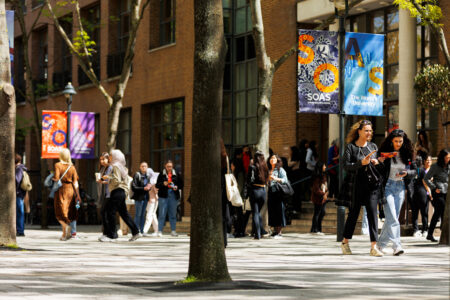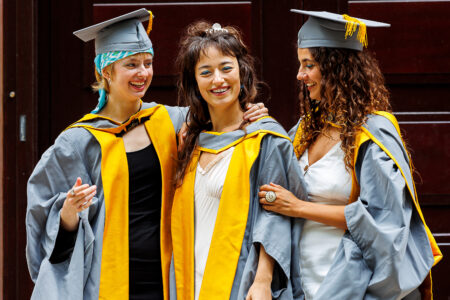Dream of navigating bustling marketplaces in Marrakech, uncovering the mysteries of ancient Sanskrit texts, or analysing contemporary African politics? Mastering a language is just the first step on this journey. SOAS University of London‘s School of Languages, Cultures, and Linguistics offers just that through its Area Studies programmes, a unique gateway to linguistic and cultural prowess.
SOAS is a global leader in Area Studies, specialising in Africa, Asia, and the Middle East. Their programmes allow students to explore their chosen region through a multidisciplinary lens, one that cuts across history, literature, film studies, politics, law, and development studies. It’s an approach that lets students tailor what they learn to their interests whilst leveraging faculty expertise across various disciplines.
Each programme culminates in a dissertation — a deep dive into your chosen topic, mentored by a faculty member. This flexibility is desirable to those who have focused on a particular discipline for their undergraduate degree, but now seek a more multi-modal, multidisciplinary degree. Perhaps you have lived or worked in a particular region and want to enrich your experience within an academic framework. Or maybe your heritage draws you to a specific area. Whatever your motivation, Area Studies at SOAS equips you with a skill set applicable to various aspirations.
Recent graduates have landed positions at Amnesty International, BBC World Service, The World Bank, Ernst & Young, Wall Street Journal, and The Telegraph. This diverse array of career paths highlights the programme’s focus on transferable skills — valuable assets in today’s globalised world.
SOAS offers a rich selection of Area Studies programmes. These include the MA African Studies, MA Middle Eastern Studies, MA South Asian Studies, and MA South East and Pacific Asian Studies. As an integral component of your Area Studies journey, you’ll be encouraged to study a language native to your chosen region. Choose from African languages like Amharic or Somali, Middle Eastern languages like Persian, Turkish or Arabic, South Asian languages like Hindi or Bengali, or Southeast Asian languages like Indonesian, Thai or Vietnamese.
In the MA African Studies, the collaborative spirit thrives due to the many backgrounds of students and instructors. This creates a participatory environment where everyone’s knowledge contributes to a richer learning experience — something Senior Lecturer in Swahili Dr. Ida Hadjivayanis can attest to. “Everyone has a stance when it comes to realities that we face globally and prompted by academic thinking, we engage to find solutions collaboratively,” she says.
Dr. Hadjivayanis herself has studied and lived in multiple countries, including her motherland Tanzania, as well as Lesotho, Guinea Conakry, Sudan, Italy, France and the UK. She brings a personal and professional understanding of the continent. “The lens through which my teaching is built has its source in my region of interest — East Africa, specifically the west of the Indian Ocean — the Swahili coast. This is a region that has seen trade networks across the sea from East Africa to the Arabian Peninsula, India and all the way to China, for centuries,” she says.
“One cannot study economics in my region without appreciating the fact that a large number of terminologies that refer to trade and a mercantile way of life in the region’s lingua franca – Swahili – have origins in the Arab world and to a smaller extent India.”
The MA Middle Eastern Studies programme focuses on the modern era, offering history, geography, politics, economics, and anthropology modules. Programmes like MA Islamic Studies and MA Iranian Studies cater to more granular areas of interest within the Middle East. Here, students examine these regions through the multifaceted lenses of local and regional cultures, languages, history, society, and politics.
Dr. Ali Alavi, a lecturer specialising in Middle Eastern and Iranian Studies, exemplifies this pedagogical approach: “My teaching experience, particularly with courses such as ‘Remapping Area Studies in Asia, Africa, and the Middle East’ alongside Iranian Studies, enables the integration of socio-cultural and political perspectives within the Iranian studies curriculum,” he expresses. “Within our Department of Languages, Cultures, and Linguistics, we try to amalgamate the study of local and regional cultures. This bottom-up approach empowers students to detect the intricate interplay between domestic and regional elements, cultural idiosyncrasies, and international relations, thereby enhancing their comprehension of the region’s multifaceted dynamics.”
 SOAS has diverse programme offerings, but what truly sets it apart is its events focused on Africa, Asia, and the Middle East, organised by regional centres and institutes, and spotlighting cutting-edge research in these areas.Rachel Harrison, Professor of Thai Cultural Studies, highlights South East Asia’s position as a crossroads, where for centuries, external influences — from India, China, and the Middle East — have been creatively absorbed and adapted. The Ramayana, a Hindu epic, is an example of this. Its journey across the region transformed the story, with new elements woven in and others discarded to resonate with local contexts. This emphasis on cultural interconnection goes hand-in-hand with SOAS’s belief that true understanding necessitates language and cultural fluency.
SOAS has diverse programme offerings, but what truly sets it apart is its events focused on Africa, Asia, and the Middle East, organised by regional centres and institutes, and spotlighting cutting-edge research in these areas.Rachel Harrison, Professor of Thai Cultural Studies, highlights South East Asia’s position as a crossroads, where for centuries, external influences — from India, China, and the Middle East — have been creatively absorbed and adapted. The Ramayana, a Hindu epic, is an example of this. Its journey across the region transformed the story, with new elements woven in and others discarded to resonate with local contexts. This emphasis on cultural interconnection goes hand-in-hand with SOAS’s belief that true understanding necessitates language and cultural fluency.
An increasingly popular option is the intensive language pathway, which allows you to combine language study with a discipline like Linguistics, History, Anthropology, or Area Studies. This full-time, two-year programme integrates additional language studies, ending in a summer abroad dedicated to further language immersion. Such a unique structure provides an effective blend of disciplinary training, intensive language learning, and an enriching cultural experience. Currently, this pathway is offered for Arabic, Persian, Turkish, Swahili, Hindi, Urdu, Indonesian, and Vietnamese.
Regardless of the programme you opt for, SOAS extends the learning experience beyond classroom walls. Its regional centres and institutes host events throughout the year, featuring film screenings, seminars with global experts, and thought-provoking discussions on pressing issues. This constant engagement with the world fosters a dynamic learning environment and equips graduates with the ability to think critically and engage with the complexities of our globalised world.
Follow SOAS University of London on Facebook, Instagram, X, YouTube, and Linkedin












